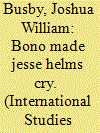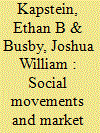| Srl | Item |
| 1 |
ID:
078283


|
|
|
|
|
| Publication |
2007.
|
| Summary/Abstract |
Do states and decision-makers ever act for moral reasons? And if they do, is it only when it is convenient or relatively costless for them to do so? A number of advocacy movements-on developing country debt relief, climate change, landmines, and other issues-emerged in the 1990s to ask decision-makers to make foreign policy decisions on that basis. The primary advocates were motivated not by their own material interests but broader notions of right and wrong. What contributes to the domestic acceptance of these moral commitments? Why do some advocacy efforts succeed where others fail? Through a case study of the Jubilee 2000 campaign for developing country debt relief, this article offers an account of persuasion based on strategic framing by advocates to get the attention of decision-makers. Such strategic but not narrowly self-interested activity allows weak actors to leverage existing value and/or ideational traditions to build broader political coalitions. This article, through case studies of debt relief in the United States and Japan, also links the emerging literature on strategic framing to the domestic institutional context and the ways veto players or "policy gatekeepers" evaluate trade-offs between costs and values.
|
|
|
|
|
|
|
|
|
|
|
|
|
|
|
|
| 2 |
ID:
146202


|
|
|
|
|
| Summary/Abstract |
When AIDS activists launched their campaign for developing world access to antiretroviral therapy in the late 1990s, this treatment cost on average $10,000 per patient per year. More than a decade later, drug prices for “first line” therapies hovered around $100 per patient per year, and nearly 13 million people in low- and middle-income countries were receiving these life-extending medications. By contrast, climate activists during the same time period labored without much success in establishing mechanisms to put a price on carbon. We identify the global market structures most conducive for social movement-led market transformations. We argue that advocacy collective action is more likely to be successful when the global market structure involves (i) a small number of product markets, (ii) globally integrated product markets, (iii) a relatively concentrated industry with few producers or buyers, and (iv) a source of rents produced through social construction rather than natural or technological barriers to entry.
|
|
|
|
|
|
|
|
|
|
|
|
|
|
|
|